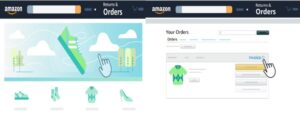VAT Rules for Overseas ecommerce Businesses
One of the key VAT rules for overseas Ecommerce businesses is determining which countries VAT is payable in. When goods are sold on an online marketplace. This can be important because of the joint and several liability rules imposed by HMRC for online market places.
What is an online marketplace?
Online marketplace is a website which allows people to sell either goods or services over the internet.
An online marketplace will typically have an operator. This is someone who can control what goods and services are sold on the website and who can sell them. They do not have to sell goods and services through the website themselves.
eBay and Amazon are two good examples of major online marketplaces. However, there are other smaller businesses which sell goods and services to UK customers on behalf of overseas suppliers. Etsy is an example of this type of business. Whether or not the goods and services are sold by the UK-based business or the overseas supplier is down to them.
Why were these rules introduced UK VAT?
Some Ecommerce businesses were selling goods in the UK from outside of the EU single market and avoiding payment of UK VAT. These rules were therefore targeted at overseas sellers.
In order, to ensure overseas sellers are compliant and following the online marketplace HMRC VAT, HMRC have introduced two options:
- The business must appoint a UK VAT ‘representative’. This is someone who is responsible for paying UK VAT. The responsibility of payment lies totally with them.
- Make operators ‘jointly and severally’ liable for paying VAT. Every operator has equal responsibility for the VAT of a business and must ensure that it is paid.
What is an overseas seller?
You can see HMRC’s definition of an overseas seller here. Essentially it is someone that does not have a business establishment in the UK. It is important to mention that the mandatory VAT registration threshold does not apply to an overseas seller. Therefore, an overseas seller must pay UK VAT on their very first sale of imported goods sold in the UK.
Overseas based Ecommerce businesses frequently use fulfilment houses. A fulfilment house is a business that essentially provides a service of storage and arranging subsequent delivery to the Ecommerce businesses customers of their goods. These goods are usually imported from outside the EU. It have been cleared for customs purposes.
HMRC could have powers to remove or reject the fulfilment houses. HMRC has right approval to trade and impose penalties or criminal charges if non-compliant. Therefore, if you are an overseas Ecommerce business using a fulfilment house. They will want to be satisfied that you are VAT compliant.
What happens if an overseas seller does not comply?
Where HMRC perceives a business is not paying the correct amount of VAT, they will take the following action:
- Once HMRC has spotted a non-compliant business, clients will either require them to register for VAT or require them to appoint a UK VAT representative.
- HMRC will then request payment of UK VAT from the business or their appointed representative.
- If the business is still non-compliant or they owe a material amount of VAT, the online marketplace will then become involved.
- On the first occasion, HMRC will normally informally contact the online marketplace before a formal notice is issued.
- A formal notice will then be issued stating that the online marketplace is ‘jointly and severally liable’ for the VAT payments. Clients are now partly responsible for paying VAT as well as the business itself.
VAT rules for online marketplace after UK VAT number receive
Once a notice has been issued, it can either remove the business from the marketplace or order the business to pay VAT. The business can then resume trading on the online marketplace after UK VAT number.
After a notice has been issued, if the online marketplace continues to host the small business after the period of non-compliance. Payment VAT online deems them to be permanently jointly and severally liable for any VAT liability. This is meant to prevent online marketplaces hosting sellers which are known to be non-compliant with their UK VAT obligations.
Although HMRC state the above rules apply to all overseas businesses. Clients are aimed at businesses which have no genuine establishment in the EU or UK.
Therefore, if you are an overseas business selling goods to the UK. It is very important to ensure you are VAT compliant. Clients run the risk of being removed from your online marketplace. Therefore check UK VAT number whether how much is UK VAT.


